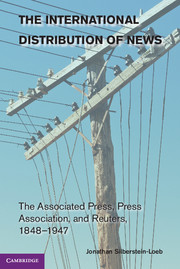 The International Distribution of News
The International Distribution of News Book contents
- Frontmatter
- Dedication
- Contents
- List of Tables
- Acknowledgments
- 1 Introduction
- 2 Conceiving Cooperation among American Newspapers, 1848–1892
- 3 Cooperation, Competition, and Regulation in the United States, 1893–1945
- 4 The “Rationalist Illusion,” the Post Office, and the Press, 1868–1913
- 5 Private Enterprise, Public Monopoly, and the Preservation of Cooperation in Britain, 1914–1941
- 6 Reluctant Imperialist? Reuters in the British Empire, 1851–1947
- 7 Cartel or Free Trade: Supplying the World’s News, 1856–1947
- 8 Conclusion
- Bibliography
- Index
- References
5 - Private Enterprise, Public Monopoly, and the Preservation of Cooperation in Britain, 1914–1941
Published online by Cambridge University Press: 05 July 2014
- Frontmatter
- Dedication
- Contents
- List of Tables
- Acknowledgments
- 1 Introduction
- 2 Conceiving Cooperation among American Newspapers, 1848–1892
- 3 Cooperation, Competition, and Regulation in the United States, 1893–1945
- 4 The “Rationalist Illusion,” the Post Office, and the Press, 1868–1913
- 5 Private Enterprise, Public Monopoly, and the Preservation of Cooperation in Britain, 1914–1941
- 6 Reluctant Imperialist? Reuters in the British Empire, 1851–1947
- 7 Cartel or Free Trade: Supplying the World’s News, 1856–1947
- 8 Conclusion
- Bibliography
- Index
- References
Summary
World War I helped to precipitate the demise of the settlement achieved under the Telegraph Act of 1868, but it did not collapse until the eve of World War II. The end of war in 1918 ushered in an age of “rationalization” among newsgatherers, concentration of ownership among newspapers, and a period of increased competition in both sectors. The British government played an important part in this process by creating an environment generally conducive to rationalization and combination, particularly during the wars and especially with respect to broadcasting, even if the rationale that motivated interwar intervention was not as explicit as that which motivated the Victorians. The BBC, established as a public corporation in 1926, wielded considerable power in the market by virtue of the monopoly granted to it by the state. The threat the BBC posed to existing industry alliances undermined cooperation and precipitated merger. Seen in this light, the subsidization of the press by the British state did not disappear. Instead, it shifted to radio. The creation of the BBC marked the end of the consensus established in 1868 and signaled the start of a new policy regime with respect to news.
The war brought to fruition those changes already underway in the 1890s. The PA embraced leased lines, but it continued to rely on the London press, Extel, and Reuters to subsidize the news reports it provided to the provincial press. Only when these alternative lines of revenue dried up, was the PA forced to charge provincial newspapers differently for a like service of news. As in other areas of industrial activity, such as alcohol and chemicals, mergers occurred during the interwar period among firms previously linked by agreements. Reuters and the PA merged, which in retrospect appears to have been the culmination of a fifty-five-year courtship, the operations of Extel and the PA became more closely intertwined, and the PA purchased Central News, a tertiary organization that had long been the PA’s foil. More so than before the war, the landscape in Britain resembled that in the United States. The British United Press (BUP), a subsidiary of the American UP, increased competition in the United Kingdom. The largest visible difference between the two countries lay in their varying responses to broadcasting.
- Type
- Chapter
- Information
- The International Distribution of NewsThe Associated Press, Press Association, and Reuters, 1848–1947, pp. 125 - 162Publisher: Cambridge University PressPrint publication year: 2014
